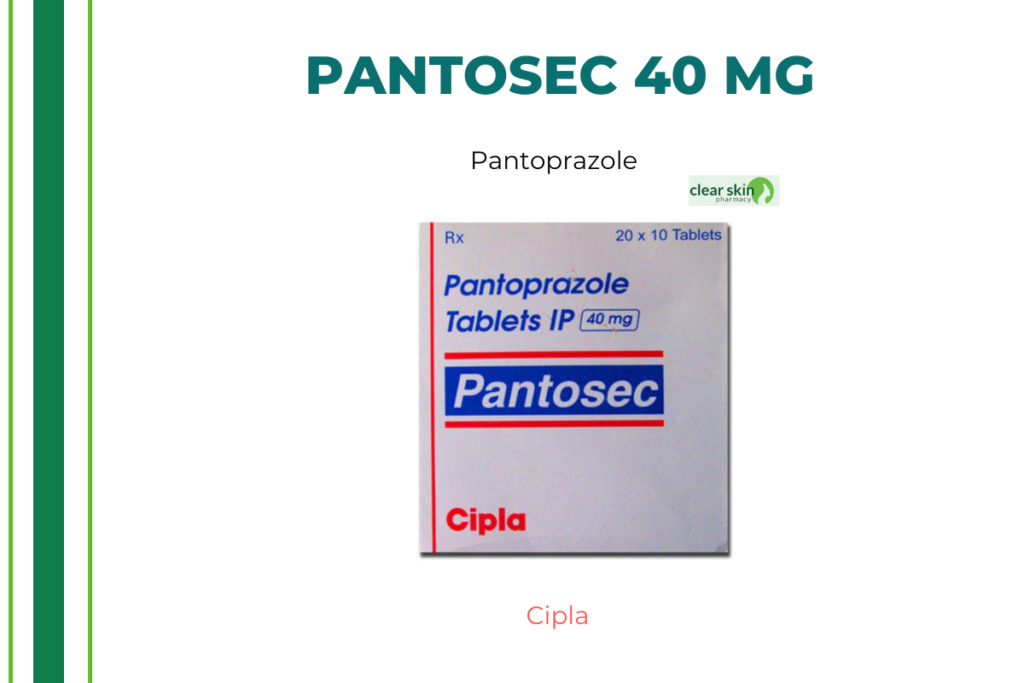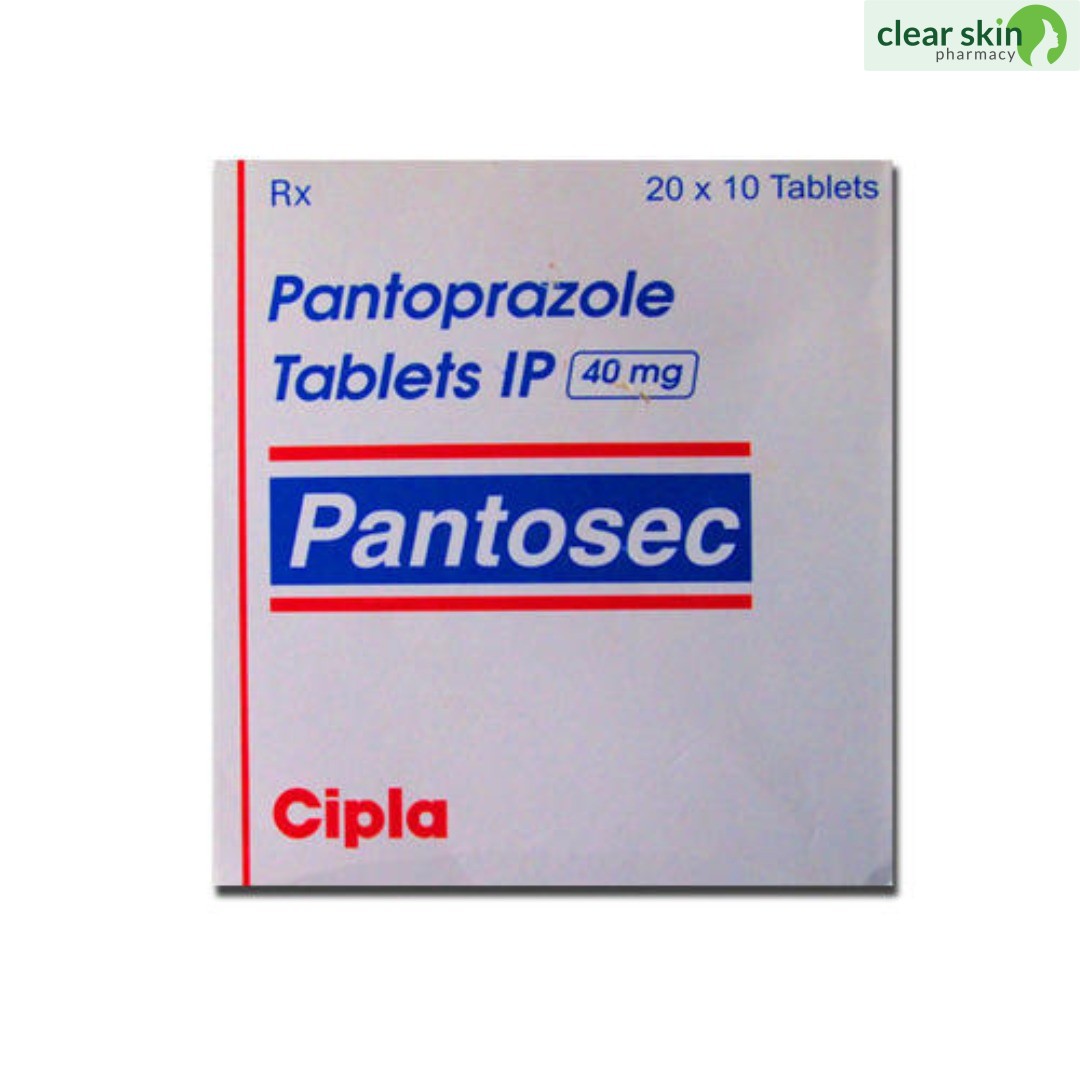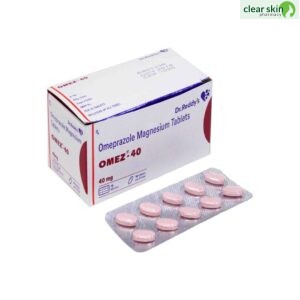Pantosec
Pantosec belongs to the medication class known as Proton pump inhibitors, which decrease the quantity of stomach acid produced. It treats gastroesophageal reflux disease (GERD), stomach ulcer, Zollinger Ellison syndrome (acid overproduction owing to pancreatic tumor), duodenal ulcer, gastric ulcer, and ulcers related with Crohn’s disease.
Pantosec aids in the reduction of stomach acid by inhibiting an enzyme (H+/K+ ATPase or gastric proton pump). This proton pump resides in the cells of the stomach’s wall and is responsible for the secretion of gastric acid that damages the tissues of the esophagus, stomach, and duodenum. Pantosec inhibits the production of stomach acid and alleviates the symptoms of esophagitis, gastroesophageal reflux disease (GERD), and heartburn.
Pantosec can be prescribed to adults and children over the age of 12 years old. Pantosec should be taken an hour before a meal. Pantosec should be taken with a full glass of water. Not to be chewed, crushed, or broken. Pantosec is also available in liquid form for those who cannot swallow capsules or tablets. Do not take Pantosec for longer than four weeks without visiting a physician. You can boost the effectiveness of Pantosec by consuming frequent small meals and snacks. Avoid caffeinated beverages (coffee, tea), spicy/deep-fried/processed foods, carbonated drinks, and acidic foods such as citrus fruits and vegetables (tomatoes).
Common Pantosec side effects include headache, diarrhea, nausea, abdominal pain, vomiting, flatulence, dizziness, and arthralgia in adults (joint pain). In children taking Pantosec, upper respiratory tract infections (URI), headache, fever, diarrhea, vomiting, rash, and abdominal pain are possible side effects. These adverse effects are transitory and may resolve over time; however, if they persist, consult your physician.
Pantosec is safe for use during pregnancy and breastfeeding, but only after contacting a physician. Inform your physician if you have stomach or intestine cancer, a liver condition, an allergy to Pantosec, or if you will be undergoing an endoscopy in the future. Long-term usage of Pantosec may result in vitamin B12 insufficiency as well as low levels of calcium, magnesium, and vitamin D, leading to osteoporosis.

Uses of Pantosec
Hyperacidity, Heartburn, Peptic ulcer
Medicinal Benefits
Pantosec is useful in treating erosive esophagitis (inflammation of the food pipe), gastroesophageal reflux disease (heartburn), Zollinger-Ellison syndrome, duodenal ulcer, gastric ulcer, and Crohn’s Disease-associated Ulcers. Pantosec functions by blocking irreversibly the proton pump gate (which secretes stomach acid). It can be administered to all age groups, including old, pregnant, breastfeeding, and patients with renal and liver disorders.
Directions for Use
Pantosec should be taken an hour before a meal. Pantosec should be taken with a full glass of water. Not to be chewed, crushed, or broken. Pantosec is also available in liquid form for those who cannot swallow capsules or tablets. Do not take Pantosec for longer than four weeks without visiting a physician.
Storage
Place in a cool, dry location out of direct sunlight.
Side Effects of Pantosec
An adult taking Pantosec may experience the following typical adverse effects:
Headache.
Diarrhea, nausea, abdominal pain, vomiting.
Flatulence.
Dizziness.
Arthralgia (joint pain).
In the case of children taking Pantosec might report,
Upper respiratory tract infections (URI).
Headache.
Fever.
Diarrhea
vomiting.
Rash.
Abdominal pain.
These adverse effects are transitory and may resolve over time; however, if they persist, consult your physician.
Drug Warnings
If you are allergic to Pantoprazole or proton pump inhibitors, have gastric cancer, liver illness, low magnesium level (osteoporosis), low vitamin B12, are pregnant or planning to become pregnant, or are breastfeeding, you should not use Pantoprazole. Pantoprazole may interact with a blood thinner (warfarin), an antifungal (ketoconazole), an anti-HIV medication (atazanavir, nelfinavir), iron supplements, an antibiotic (ampicillin), and an anti-cancer medication (methotrexate). Inform your physician if you are taking these medications. Pantoprazole may cause lupus erythematosus (an inflammatory disorder in which the immune system attacks its own tissues), vitamin B12 insufficiency, and magnesium deficiency if taken for an extended period of time. Pantoprazole may conceal the symptoms of gastric cancer; thus, if you have severe stomach discomfort or gastric bleeding (blood in mucus or stool), visit a doctor promptly.
Drug Interactions
Pantoprazole may interact with blood thinners (clopidogrel, warfarin), antifungals (ketoconazole, voriconazole, itraconazole, posaconazole), anti-HIV medications (atazanavir, nelfinavir), iron supplements, antibiotics (ampicillin, rifampin), cardiac medications (digoxin), and anticancer medications (methotrexate). Inform your physician if you are taking these medications.
Drug-Food Interaction: Pantoprazole interacts with the antidepressant herb St. John’s wort. This plant may interfere with Pantoprazole’s effectiveness. Therefore, avoid using it with Pantoprazole.
Pantoprazole should not be administered to individuals with C. difficile-induced colitis, liver illness, bone fractures, low Vitamin B12 (anemia), or low magnesium levels (hypomagnesemia).
Safety Advice
ALCOHOL
Consuming alcohol while taking Pantoprazole may lead to dehydration and an increase in stomach acid, hence lowering its effectiveness. Therefore, avoid or restrict alcohol consumption or consult your doctor before using Pantoprazole.
PREGNANCY
It is unknown if Pantoprazole impacts fetal development. Therefore, see a physician before to taking Pantoprazole. Before prescribing it, your doctor will balance the advantages and any potential hazards.
BREAST FEEDING
Pantoprazole is excreted into breast milk. However, no risk indicators have been reported. Please with your physician before to taking Pantoprazole. Before prescribing it, your doctor will balance the advantages and any potential hazards.
DRIVING
In some situations, Pantoprazole may produce dizziness, drowsiness, or foggy vision. Do not drive or operate heavy machinery if you see these symptoms until you feel better.
LIVER
Pantoprazole should be used with caution to patients suffering from liver illness.
KIDNEY
Before taking Pantoprazole, kidney disease patients should visit a physician.
Habit Forming : No
Diet & Lifestyle Advise
Avoid consuming acid-producing or heartburn-inducing foods and beverages, such as onions, peppermint, chocolate, caffeinated beverages, citrus fruits or juices, tomatoes, and high-fat and spicy foods.
Before going to sleep, you should attempt to raise the bedhead so that your head and chest are higher than your feet. Instead of using mounds of pillows, a single elevated block is sufficient. This will prevent stomach acid from flowing back into the esophagus.
Avoid consuming alcohol and smoking tobacco. Alcohol can increase stomach acid production, resulting to heartburn and acid reflux. However, nicotine smoking affects the valve (sphincter) that stops stomach acid from flowing back into the food pipe.
Include in your meal items rich in fiber, such as berries, cherries, leafy green vegetables (kale, spinach), and black pepper. These meals are rich in antioxidants, calcium, and vitamin B12, which can aid in coping with the medication’s long-term side effects. Miso, sauerkraut, and kimchi are fermented dairy products that include probiotics that reduce excess stomach acid production. Cranberry juice is useful for ulcers and H Pyroli infections.
Sitting for extended periods of time might increase stomach acid production. Try to take a 5-minute break every hour by walking briskly or stretching.
Special Advise
Individuals at risk for osteoporosis-related fractures must consume sufficient calcium and vitamin D.
Pantoprazole has infrequently caused vitamin B-12 insufficiency, which requires regular monitoring. The risk increases if they are taken daily for an extended period of time.
Pantoprazole may interfere with some laboratory tests (such as urine testing for tetrahydrocannabinol-THC and blood tests for detecting certain cancers), thereby resulting in incorrect test findings. Make that laboratory technicians and all of your physicians are aware that you are taking Pantoprazole.
Other Information : This item is Not Returnable.
Patients Concern
Typically, a thick mucous barrier protects the stomach from its own acid output. On the other hand, excessive stomach acid production erodes it over time, causing issues such as GERD, peptic ulcer, and Zollinger Ellison syndrome. Gastroesophageal reflux disease (GERD) is a digestive disorder that develops when stomach acid runs back into the esophagus on a regular basis (esophagus). This backflow (acid reflux) produces heartburn by irritating the esophagus. Peptic ulcer, on the other hand, is a painful disorder characterized by the development of sores or ulcers in the stomach lining or duodenum (initial portion of the small intestine) (the duodenum). Zollinger Ellison syndrome is a rare illness in which a pancreatic tumor that secretes gastrin leads to excessive acid production and peptic ulceration.
FAQs
Pantoprazole may cause atrophic gastritis (inflammation of stomach cells), Vitamin B12 insufficiency, and bone loss or osteoporosis if taken over an extended period of time (loss of calcium, magnesium and vitamin D). To manage long-term side effects, your doctor may prescribe calcium, vitamin D, or hemoglobin-enhancing drugs.
Pantoprazole is not used to treat stomach cancer. Do not take Pantoprazole unless prescribed by your doctor. Pantoprazole is only prescribed to treat hyperacidity, acid reflux symptoms (GERD), heartburn, and Zollinger Ellison syndrome.
Gas and acid reflux are two typical discomforts. Acidity is generated when the valve (sphincter) at the intersection of the stomach and food pipe does not operate properly. Thus, stomach acid travels backward and enters the upper portion of the esophagus, creating heartburn. On the other side, gas is the consequence of the digestion of food and drink, which rids the body of gases such as carbon dioxide, hydrogen, nitrogen, and methane.
Pantoprazole can disrupt certain medical tests, including those for neuroendocrine tumors (secretin stimulation test) and urine tetrahydrocannabinol screening (THC). Contact your doctor before undergoing any diagnostic tests.
Long-term use of Pantoprazole may weaken bones and decrease hemoglobin levels. Your physician may prescribe you Vitamin B12 to improve your hemoglobin and calcium/vitamin D/magnesium to maintain healthy bones.
Pantoprazole inhibits the creation of excess stomach acid, hence preventing acid reflux and heartburn. Contact a physician immediately if you notice blood in your stools or mucus.








Be the first to review “PANTOSEC 40 MG 10 Tablets”